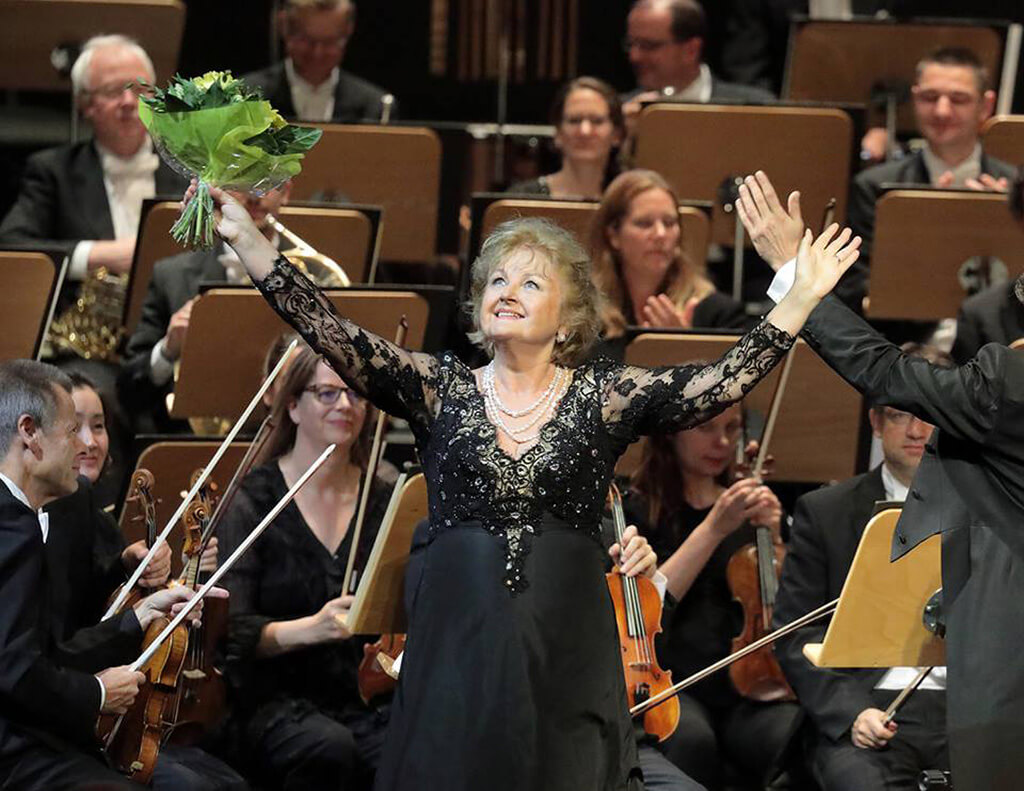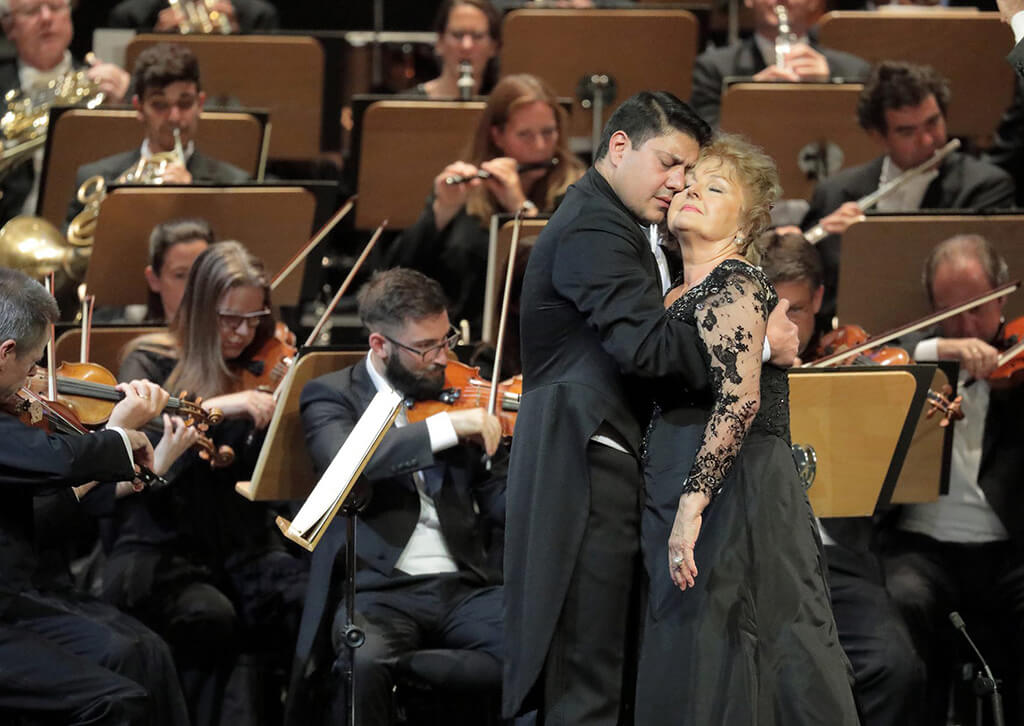
Bayerische Staatorchester, Edita Gruberova (soprano), Marco Armiliato, conductor; National-theater, Munich. July 3, 2018.
MUNICH — If there is any career that is fleeting in the arts, it would be that of an opera singer. Together with the classical ballet dancer, these two professions are synonymous with impermanence. Some artists shine brightly for a while and then disappear without a trace. In opera, a 20-year career singing lead roles is considered excellent; 30-year career nothing less than exceptional. A 50-year career as a leading lady in some of the most demanding roles in the operatic repertoire? Unheard of — unless you are talking about the Slovakian soprano Edita Gruberova.
Born in December 1946 in Bratislava in former Czechoslovakia, Edita Gruberova is 72 and still as busy as ever. Unlike other prima donnas who gracefully transitioned to character roles, Gruberova soldiered on with her Normas, Lucrezia Borgias and Elisabettas in Roberto Devereux. Just two months ago, she assayed Lucrezia Borgia in Munich. There were naysayers, but the vast majority of her loyal Munich audience loved her just the same.
This year marks the 50th-anniversary of her debut, as Rosina in her hometown of Bratislava. To celebrate this momentous occasion, Gruberova gave a gala concert last evening at the Bayerische Staatsoper, as part of this year’s Festspiele. The Italian maestro Marco Armiliato was at the helm, leading the Bayerisches Staatorchester. As is typical of these starry events, the program last evening was short. The two roughly 45-minute halves plus a 20-minute intermission. Started a few minutes after seven, it was all over by about ten to nine. First half was forty-five minutes, with all the bravas and bows included. It consisted of three overtures – from Entfuhrung, Don Giovanni, and Idomeneo. Gruberova sang Konstanze’s “Traurigkeit,” Donna Anna’s “Non mir dir” and Elettra’s barnburner at the end of Idomeneo.
The soprano sounded exactly the way she has for some years. Her tone has aged very little, still fresh and clear, especially in the upper third, albeit with some loss of steadiness throughout. Her technique remains remarkable, capable of any dynamic level. She tends to sing with lots of mezza voce, with little vibrato. The middle voice is now weaker, and the bottom register more problematic – the lowest notes in the “D’Orest d’Ajace” gave her trouble. Occasionally a high note could be off-center, but she nearly always managed to coax her vocal cords to do the right thing. Nobody can truly turn back the clock, including Edita Gruberova, but whatever time has taken away from her vocally, her artistry remains intact.
After a brief intermission, she raised the intensity up a notch in the second half, with a virtually complete Act 4 La Traviata, beginning with an affecting “Addio del passato.” I find myself moved by her. She used a lot of parlando in the letter reading and the aria, managing the lowest notes with more emotion than voice. She was very well partnered by young German-Turkmen tenor Dovlet Nurgeldiyev, a voice unfamiliar to me. His sweet, smooth, warm tone and ardent manner was a complete pleasure. I look forward to hearing him again. Also impressive was Slovak baritone Boris Prygl. Both gents are decades younger than Violetta, but let’s just say dramatic verisimilitude took a back seat to the importance of the occasion.

Conductors in these starry events must be singer-friendly, and Marco Armiliato is a great choice — musical, sympathetic and as supportive as one can expect to the artists. He and the orchestra contributed the Vorspiel from Act 4 La traviata, and the overture to Norma. The final item on the regular program was Amina’s “Ah! Non credea” from La sonnambula. Here Gruberova pulled out all the stops, going for broke, and when EG gives her all, you’d better sit up and take notice! She sang the E flat and every single high note, all with plenty of power and on pitch. If the runs weren’t as clean as in past decades, I think her fans didn’t mind. That was the short formal program, and you just know in the bones that there was more to come. The orchestra musicians were patiently sitting in their seats, knowing they were not off duty for quite a while yet!
The ovation after the Sonnambula aria was immense. After many, many minutes of applause, she finally sang her first encore — “Dich teure Halle” — a real surprise and obviously in honour of the Munich Opera House, one of her favourite venues. The audience went berserk. I doubt she has ever sung Elisabeth on stage, and I would imagine this is as close as we are going to get. Her instrument at 72 years of age is strained by the demands of Wagner, and there was some unsteadiness here and there. It didn’t matter – the audience was enraptured.
More ovations followed, minutes and minutes of it, and she sang Adele’s “Mein Herr Marquis” from Die Fledermaus. She was totally relaxed at this point, and had a whale of a time with the Laughing Song, acting it to the hilt. I found myself laughing out loud. I think you can imagine the applause that followed. Lots of rhythmic applause at this point, and the audience simply wouldn’t let her go. Armiliato the good guy he is, kept coming out with her and kissing her hand etc. Her fans were rushing to the front to give her flowers and gifts, shaking hers and the Maestro’s hands. At one point, responding to someone in front, Armiliato good-naturedly shrug his shoulders and spread his hands forward, as if to say: “I have nothing to do with this!” Well, it totally cracked me up!
The shenanigans lasted from 8:50 p.m. to 9:38 p.m. when I walked out of the theatre. If there is one thing I learned from this experience, it is what star power is truly like, and what it can do. Who in opera has this magnetism today? Nobody! Well, perhaps Anna Netrebko. Yes, but she is not 72. When she is that age and can sing on this level, future generations of opera fans will be equally delirious. I have often wondered what makes prima donnas continue well past their prime. Yes, even the most ardent Gruberova fans will have to admit their idol is past her best. But she still has enough to give, and we are grateful. Her fans need her, and she needs the applause – after witnessing this last evening, I am convinced that she cannot do without the adulation. With a four-city tour of Japan coming up in October and more performances next season to Munich, you can still catch the Gruberova magic. Book your tickets!



